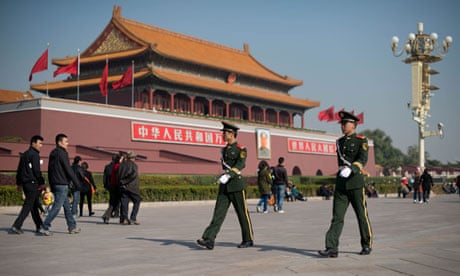For Beijing residents to understand the gravity of the upcoming 18th congress of the Chinese Communist party, they need only to take a taxi. Or buy a toy. Or own a pigeon.
While the Chinese government often boosts security during sensitive political meetings, measures surrounding the forthcoming congress border on extreme: Authorities have placed restrictions on buying remote-controlled helicopters, warned cab drivers to child-lock their doors, and instructed pigeon-fanciers to keep their birds caged.
During the congress, which begins next Thursday, more than 2,000 delegates from across the country will gather in Beijing to approve a once in a decade leadership transition. Seven out of the country's nine top leaders will step down, including president Hu Jintao and prime minister Wen Jiabao.
Joshua Rosenzweig, a human rights researcher in Hong Kong, said the authorities' clampdown on seemingly banal activities springs from an "overabundance of caution". "They can't control everything, but they will do their best to try," he said.
Chinese social-networking websites are rife with anecdotes about vanishing street food stalls and overbearing new security checks at train stations. Conferences, music festivals, football matches, and even the internationally well regarded Beijing marathon have been cancelled at short notice.
Shopkeepers have been instructed to remove sharp items such as kitchen knives and pencil sharpeners from their shelves. The Happiness Supermarket in central Beijing replaced its stock of knives with neat rows of can openers and potato peelers. "The police came in and said we're just not allowed to sell them," said an employee.
There have been even stranger developments. Beijing's taxi drivers have been instructed to dismantle their backseat window cranks and child-lock their doors. "The company management said at the meeting that in the past, some passengers had thrown leaflets out of the taxi window," one driver told the Global Times. A widely circulated post on Sina Weibo, the popular microblogging website, shows an ostensibly leaked set of rules for taxi drivers to follow during the congress. One instructs them to refrain from driving through "areas of political importance". Another warns them to keep an eye out for passengers holding slogan-bearing balloons and "ping-pong balls bearing reactionary messages".
Balloons and model planes have been banned during the congress, according to the state-run Global Times newspaper, which also quoted a police officer as saying that pigeon enthusiasts – ubiquitous in the city's old-fashioned neighbourhoods – must keep their birds grounded.
Official notices have appeared on toy-store sales counters restricting the sales of remote-controlled helicopters – aspiring customers must now register at nearby police stations with their government-issued IDs, reported the Beijing Youth Daily.
The security effort is striking if only for its sheer scale. Beijing authorities have "processed" 33,000 cases of "illegal activities" such as gambling, prostitution and unlicensed taxis since August, according to Xinhua, China's official newswire. Some 1.4 million volunteers have been recruited to bolster the capital's security presence. 1,725 businesses have been shut down.
The former political prisoner Hu Jia said in a phone interview that he has been under tight surveillance since 18 September, when rumours about the conference date started to spread(The authorities did not announce the meeting's actual starting date until September 28th).
On 20 October, state security officers escorted Hu to a train station in Beijing and bundled him off to his hometown in Anhui province. Hu said the police threatened his parents with violence if he returned to Beijing before the end of the meeting.
"This has been way worse than the 17th party congress," Hu said, referring to a similar event in 2007, while he was formally under house arrest. "At that time I was allowed to go out and buy things to eat. This time there's just no way."
Wu Lihong, an activist who was jailed from 2007 to 2010 for his environmental campaigning, said that the police have not allowed him to travel since the summer.
Yet according to Wu, police in his hometown near Lake Tai in Jiangsu province were afraid that sympathetic neighbors would help him flee to Beijing, so offered to take him on a chaperoned "vacation" to scenic Huang Mountain in Anhui Province until late November.
"They say let's go look at the scenery, it's really beautiful, we'll go travel," Wu said in a phone interview from Lake Tai. "But I won't go, and this gives them a headache."
Zhang Feng, an official at the ministry of industry and information technology, denied rumours that China's internet will be shut down during the 18th party congress. But, Zhang told the 21st Century Business Herald newspaper, it will undergo maintenance "to guarantee the conference can smoothly complete its work duties". The term "18th party congress", as well as the names of top political leaders including Hu, Wen, and presumptive future president Xi Jinping, have been blocked on Sina Weibo.
